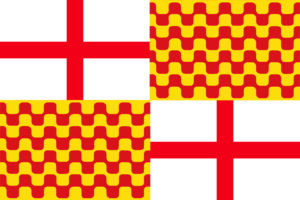An ironic introduction of Tabarnia
“What is Tabarnia?” – is the question that most people have asked themselves after last month’s Twitterstorm. The word ‘Tabarnia’ has been trending for weeks on social media in Spain and especially in Barcelona. Even the political leaders from different parties in Spain have stated their opinion about Tabarnia. Now also international newspapers like the Guardian and the New York Times are getting interested in it.
Because I am not an expert on Tabarnia, I decided to dig a little deeper into the subject. Here is what I found.
A satirical political project?
According to Wikipedia Tabarnia is a satirical political project seeking a referendum to create a new autonomous community that would remain part of Spain if Catalonia somehow becomes independent. Tabarnia is a combination of the names of Catalonia’s two main cities on the Mediterranean coast – Tarragona and Barcelona.

The idea of Tabarnia was born in 2012 with the platform “Barcelona is not Catalonia”. The movement was formed by professionals, among them teachers, small businessmen and historians concerned about seeing Barcelona involved in an independence process deeply negative for their interests.
Catalonia robs Tabarnia
Supporters of Tabarnia are trying to distance themselves from the Catalan separatist movement, because in the metropolitan area of Barcelona the support for separatism from Spain is lower than in the countryside. Also, under the current electoral law, in the province of Barcelona 48.521 votes are needed to choose one representative in the Catalan Parlament for the 20.915 votes needed in Lleida, resulting in a 2.3 ratio. Tarragona requires 31.317 votes and Girona 30.048.
Tabarnians use same types of arguments in their propaganda as the Catalan pro-independence counterparts. “Tabarnia is not Catalonia” rings similar as “Catalonia is not Spain”.
Catalan separatists have used an interpretation of economic facts to argue they have an unfavorable finance balance towards the rest of Spain. In the same way, Tabarnians argue that Tarragona’s and Barcelona’s under-representation in the Catalan Parliament has resulted in an unfavorable finance balance towards their region. The Tabarnians back up their arguments with a similar interpretation of economic data as the Catalan separatists.
In their manifesto they argue that “It is not logical or reasonable that the Generalitat collects in Barcelona’s metropolitan area 87% of its overall revenue and only invests back 59% of the collected money”. They also attack the corrupt Catalan Government, arguing that bad politics has accumulated a multi-million Euro debt of the Generalitat with the city of Barcelona.
Even history can justify their existence: The County of Barcelona, during the Middle Ages, had a similar territory to the one proposed by Tabarnians, today.
Fictional nonsense
Especially the supporters of the Catalan independence movement are quick to criticize the Tabarnia movement as fictional nonsense. But it seems obvious that they face a reflection of their own populist demands and arguments.
The main difference with these two separatist movements is that the Tabarnians are not trying to act against the Spanish constitution as the Catalan separatists did during the unilateral independence referendum and the failed declaration of independence. Tabarnians argue that a declaration of a new autonomous region inside Catalonia is legally plausible under the current constitution.
“We will go as far as the Catalan independence supporters have gone,” said Jaume Vives, a spokesman for Tabania. “Tabarnia will become secessionism’s nightmare just as they have become ours. We are a side-effect of the process. We are multicultural, free, Spanish and European.” Link
As the movement gets more followers in social media, the fictional Catalan region has appointed a 74-year-old theater director Albert Boadella for its first President. The new president abandoned Barcelona to Madrid over 10 years ago claiming that his work was being boycotted by Catalan nationalists. He did his first appearance through a video link, the same way as Carles Puigdemont who is trying to rule Catalan Parliament through video screen from Brussels.
From fiction to reality
The great thing about the Tabarnia movement is that it has brought some humor in to the bitter and divided Catalan politics. It clearly reveals some of the weaknesses in the arguments of Catalan independence supporters.
But a movement that started with irony is now becoming a reality. In Change.org there is a petition going on, where the Tabarnians are demanding from the congress of the deputies the right to decide to be a new autonomous community within Spain and independent of Catalonia. The petition has collected already more than 276 000 signatures of the required 300 000.
There is a clear warning for the Catalan Separatists that populism in political debate can lead to strange outcomes and counter movements. The petition and the movement itself is also reflecting the democratic crisis and the standstill in Catalan politics.